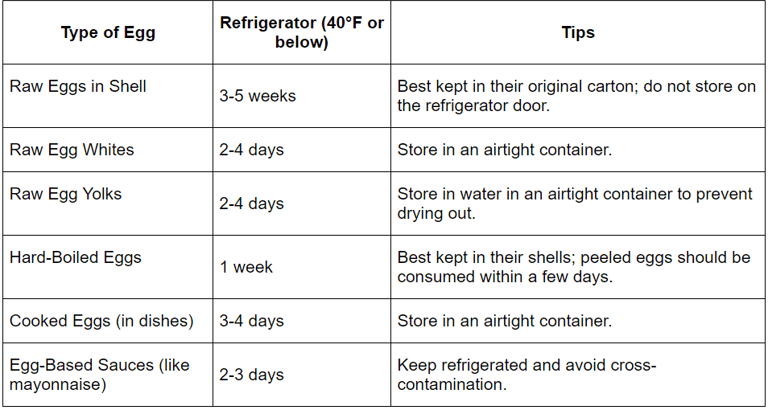How Long Do Eggs Last Before Going Bad in the Refrigerator?
Eggs are a staple in many households due to their versatility and nutritional value. However, like all perishable items, they come with a shelf life. Understanding how long eggs last in the refrigerator can help you make the most of your purchases and avoid food waste.


Factors Affecting Egg Shelf Life
Storage Conditions: Proper storage is crucial for extending the life of eggs. Eggs should be stored in their original carton and placed in the coldest part of the refrigerator, typically not on the door where temperatures fluctuate.
Egg Type: The shelf life of eggs can vary depending on whether they are raw or cooked, in or out of their shell.
Refrigerator Temperature: The ideal temperature for storing eggs is at or below 40°F (4°C). Consistent refrigeration slows down the growth of bacteria.
How to Store Eggs Properly
In the Carton: Always store eggs in their original carton. The carton helps protect the eggs from absorbing strong odors and flavors from other foods in the refrigerator.
Pointy End Down: Storing eggs with the pointy end down helps keep the yolk centered and the egg fresh longer.
Check for Cracks: Avoid storing eggs with cracks, as bacteria can enter through the cracks and spoil the eggs faster.
Shelf Life of Eggs in the Refrigerator
To help you keep track of how long your eggs will last, here is a handy chart detailing the shelf life of different types of eggs when stored in the refrigerator:
How to Tell if Eggs Have Gone Bad
Even with proper storage, it’s important to know how to identify if eggs have gone bad. Here are some tips:
Check the Expiration Date: Always check the sell-by or expiration date on the egg carton. While eggs can often be safe to eat beyond this date if stored properly, it’s a good reference point.
Perform the Float Test: Place an egg in a bowl of water. If it sinks and lies flat on its side, it’s fresh. If it stands upright or floats, it’s time to discard it. This occurs because as eggs age, the air cell inside the shell enlarges, causing them to float.
Sniff Test: Crack the egg open and give it a smell. Fresh eggs have a neutral odor, while bad eggs will give off a sulfur-like smell.
Visual Inspection: Check the egg whites and yolks. Fresh eggs will have a thick white that holds the yolk in place, while older eggs will have a runnier white and a flatter yolk.


